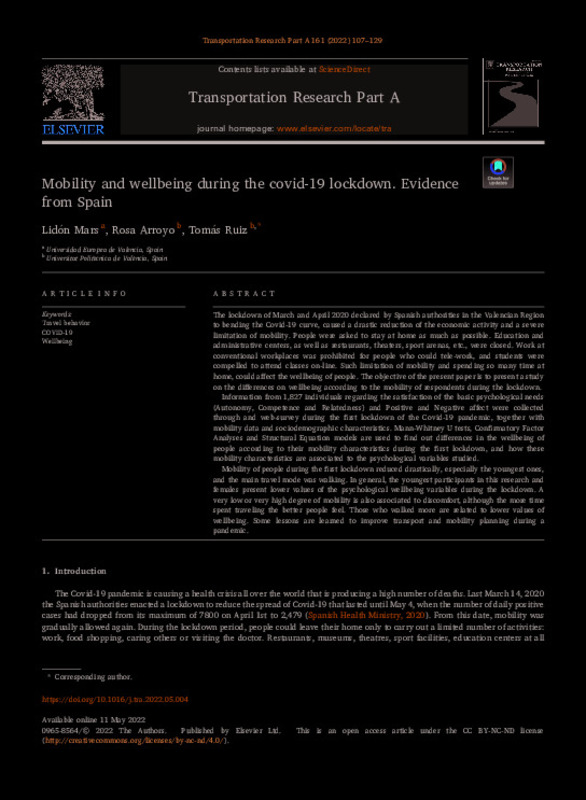JavaScript is disabled for your browser. Some features of this site may not work without it.
Buscar en RiuNet
Listar
Mi cuenta
Estadísticas
Ayuda RiuNet
Admin. UPV
Mobility and wellbeing during the covid-19 lockdown. Evidence from Spain
Mostrar el registro sencillo del ítem
Ficheros en el ítem
| dc.contributor.author | Mars, Lidón
|
es_ES |
| dc.contributor.author | Arroyo-López, María Rosa
|
es_ES |
| dc.contributor.author | Ruiz Sánchez, Tomás
|
es_ES |
| dc.date.accessioned | 2023-01-09T19:00:25Z | |
| dc.date.available | 2023-01-09T19:00:25Z | |
| dc.date.issued | 2022-07 | es_ES |
| dc.identifier.issn | 0965-8564 | es_ES |
| dc.identifier.uri | http://hdl.handle.net/10251/191162 | |
| dc.description.abstract | [EN] The lockdown of March and April 2020 declared by Spanish authorities in the Valencian Region to bending the Covid-19 curve, caused a drastic reduction of the economic activity and a severe limitation of mobility. People were asked to stay at home as much as possible. Education and administrative centers, as well as restaurants, theaters, sport arenas, etc., were closed. Work at conventional workplaces was prohibited for people who could tele-work, and students were compelled to attend classes on-line. Such limitation of mobility and spending so many time at home, could affect the wellbeing of people. The objective of the present paper is to present a study on the differences on wellbeing according to the mobility of respondents during the lockdown. Information from 1,827 individuals regarding the satisfaction of the basic psychological needs (Autonomy, Competence and Relatedness) and Positive and Negative affect were collected through and web-survey during the first lockdown of the Covid-19 pandemic, together with mobility data and sociodemographic characteristics. Mann-Whitney U tests, Confirmatory Factor Analyses and Structural Equation models are used to find out differences in the wellbeing of people according to their mobility characteristics during the first lockdown, and how these mobility characteristics are associated to the psychological variables studied. Mobility of people during the first lockdown reduced drastically, especially the youngest ones, and the main travel mode was walking. In general, the youngest participants in this research and females present lower values of the psychological wellbeing variables during the lockdown. A very low or very high degree of mobility is also associated to discomfort, although the more time spent traveling the better people feel. Those who walked more are related to lower values of wellbeing. Some lessons are learned to improve transport and mobility planning during a pandemic. | es_ES |
| dc.description.sponsorship | This research has been partially funded by Catedra Transporte y Sociedad (Generalitat Valenciana) , and the I + D + I project Travelwell + (PID2019-108843RB-I00) funded by MCIN/AEI /https://doi.org/10.13039/501100011033 | es_ES |
| dc.language | Inglés | es_ES |
| dc.publisher | Elsevier | es_ES |
| dc.relation.ispartof | Transportation Research Part A Policy and Practice | es_ES |
| dc.rights | Reconocimiento - No comercial - Sin obra derivada (by-nc-nd) | es_ES |
| dc.subject | Travel behavior | es_ES |
| dc.subject | COVID-19 | es_ES |
| dc.subject | Wellbeing | es_ES |
| dc.subject.classification | INGENIERIA E INFRAESTRUCTURA DE LOS TRANSPORTES | es_ES |
| dc.title | Mobility and wellbeing during the covid-19 lockdown. Evidence from Spain | es_ES |
| dc.type | Artículo | es_ES |
| dc.identifier.doi | 10.1016/j.tra.2022.05.004 | es_ES |
| dc.relation.projectID | info:eu-repo/grantAgreement/AEI/Plan Estatal de Investigación Científica y Técnica y de Innovación 2017-2020/PID2019-108843RB-I00/ES/NUEVAS SOLUCIONES DE TRANSPORTE, MOVILIDAD Y BIENESTAR/ | es_ES |
| dc.rights.accessRights | Abierto | es_ES |
| dc.contributor.affiliation | Universitat Politècnica de València. Escuela Técnica Superior de Ingenieros de Caminos, Canales y Puertos - Escola Tècnica Superior d'Enginyers de Camins, Canals i Ports | es_ES |
| dc.description.bibliographicCitation | Mars, L.; Arroyo-López, MR.; Ruiz Sánchez, T. (2022). Mobility and wellbeing during the covid-19 lockdown. Evidence from Spain. Transportation Research Part A Policy and Practice. 161:107-129. https://doi.org/10.1016/j.tra.2022.05.004 | es_ES |
| dc.description.accrualMethod | S | es_ES |
| dc.relation.publisherversion | https://doi.org/10.1016/j.tra.2022.05.004 | es_ES |
| dc.description.upvformatpinicio | 107 | es_ES |
| dc.description.upvformatpfin | 129 | es_ES |
| dc.type.version | info:eu-repo/semantics/publishedVersion | es_ES |
| dc.description.volume | 161 | es_ES |
| dc.identifier.pmid | 35572809 | es_ES |
| dc.identifier.pmcid | PMC9091320 | es_ES |
| dc.relation.pasarela | S\465611 | es_ES |
| dc.contributor.funder | AGENCIA ESTATAL DE INVESTIGACION | es_ES |
| dc.contributor.funder | Universitat Politècnica de València | es_ES |








